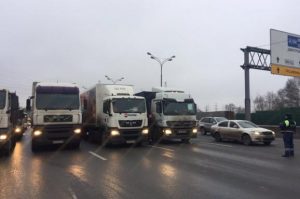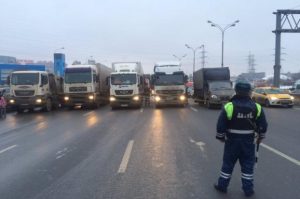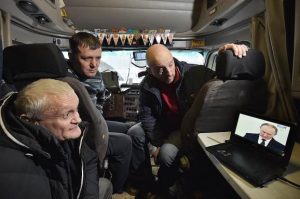Russian long-distance truckers have moved to shut down access to Moscow without waiting for Vladimir Putin's reaction to their protest demands .
On December 3, in his address to the Federal Assembly, the Russian president did not utter a single word about the long-distance truckers outraged by new road-use levies. And for good reason. Because, in Russia, the protest of the truck drivers is unique.
Protest details
First, the protest is spontaneous and is not coordinated from a single center. For that reason, the police have been unable to shut it down because other drivers immediately take the place of the ones detained.
Second, the protestors are not the usual "fifth column" opposition by intellectuals. These are, for the most part, Putin's voters -- tough guys who in elections vote for stability.
A long-distance trucker from Chechnya, who spoke with a journalist from the Vologda News internet publication, expressed the core sentiments of the truckers:
 "Six months ago every trucker was for Putin and, on the first appeal, would have traded his truck to go fight with him. But now no one would go because they're already sick of everything," he said. "While he is engaged in foreign policy, a whole gang has assembled here at home who are digging a huge hole for this Putin! How they're planning to go to elections in 2016 is not clear," he added.
"Six months ago every trucker was for Putin and, on the first appeal, would have traded his truck to go fight with him. But now no one would go because they're already sick of everything," he said. "While he is engaged in foreign policy, a whole gang has assembled here at home who are digging a huge hole for this Putin! How they're planning to go to elections in 2016 is not clear," he added.
Third, all Russians clearly understand the complaints of the truck drivers. They boil down to the fact that greedy authorities are trying to take the shirt off the back of simple workers.
In Novosibirsk, truck drivers demonstrated this idea by removing and exhibiting their underwear during protests to illustrate that the government is robbing them of everything.
For these reasons the usual methods of Russian propaganda are not very effective. The postings of the Olgino trolls (professional commentators from the "troll factory" in the Olgino district of St. Petersburg -- Ed.) that these protests are organized by the opposition look ridiculous. Attempts by mass media to ignore the truckers completely are equally ineffective because they have become a major topic in social networks.
The possible consequences of the protest
Late on December 4, it was reported that the truckers have carried out their threat and have blocked the MKAD, the beltway around Moscow. Then an announcement appeared that this was a provocation, that police had blocked the road to prevent the truckers from doing so. Then there were reports that traffic had resumed.
But the Yandex (Russian search engine) showed that a 12-km line had formed on the Moscow beltway and that it was even reported by the Russian State News Agency TASS. Meanwhile, more and more trucks have been arriving to Moscow.
What will happen next is a question with no answer yet. In fact, even the truckers themselves do not know what to do after the blockade.
If the Russian authorities use brute force, this risks repeating the fate of Yanukovych. Putin, however, has nowhere to flee from the Kremlin. Well, perhaps to Syria.
If the Kremlin does nothing, two scenarios are possible. Either the protest will come to naught because the truckers will use up their gas and will go home tired of the government's deafness. Or they will become defiant and continue the blockade, especially if concerned citizens help them with food and gas. Then the question will be how long Moscow can survive under siege. All indications are that not that long and that the authorities will have to act.
The third option is utopian: the authorities will hear the drivers and make concessions. Or at least pretend that they are ready to do so.
The reasons for the protest
The Platon system means "fees from tons" in Russian. This is a new automated system for collecting tolls from trucks weighing over 12 tons for using the federal roads. And in Russia almost all roads in decent condition that connect the larger cities are federal.
Truck drivers are supposed to install tracking devices on their trucks voluntarily to record the kilometers driven. This data is read by special tollbooths on the federal roads. Plans call for the installation of up to 480 of these tollbooths. Additionally, a hundred mobile units will travel on the highways to record the data as well. Those who do not install the Platon tracking devices are threatened with huge fines.
 Currently one kilometer in the Platon system costs 1.53 rubles. Starting in March 2016, the rate will double to 3.06 rubles. Therefore, next year Russian truckers will pay about $4.5 for every 100 km. According to their estimates, this additional tariff will represent a deficit (drivers cited their calculations to the Russian BBC service and to Kommersant).
Currently one kilometer in the Platon system costs 1.53 rubles. Starting in March 2016, the rate will double to 3.06 rubles. Therefore, next year Russian truckers will pay about $4.5 for every 100 km. According to their estimates, this additional tariff will represent a deficit (drivers cited their calculations to the Russian BBC service and to Kommersant).
The most interesting part of the newly introduced Platon system is that the owner of the company that will collect the fees is the oligarch Arkady Rotenberg, a personal friend of Putin.
The scheme is as follows: Rosavtodor (Russian state transport system) has reached an agreement with the RT-Invest Transportation System private company (RTITS is 50% owned by Rotenberg) whereby it will be granted a concession for the Platon system for 13 years. RTIS will build and finance the infrastructure and collect the money which, officially, it will turn over to the state. In return, the company will receive 10.6 billion rubles annually from Rosavtodor (around $158 million).
Rosavtodor claims that the Platon system was introduced to collect additional funds for road repair, arguing that heavy trucks cause the greatest damage. After 13 years, it plans to collect 1 trillion rubles ($15 billion).
The traffic jam on the Moscow beltway
THE blockade on the Moscow beltway will be the culmination of the trucker protests. The truckers themselves call this plan the "snail." The idea is that drivers will take up the two right lanes on the road where trucks are allowed and will move at the lowest permissible speed. The protestors hope that other lanes will be taken by cars driven by other participants in the protest. "A column of cars will move very very slowly, which will not break the law but will create traffic problems," writes Alexander Chernykh, a Kommersant journalist covering the truckers in the Moscow Oblast.
 The protest has lasted for almost three weeks. On November 30, the correspondent for BBC's Russian Service wrote that the government has managed to prevent massive protests of the long-distance truckers from different regions.
The protest has lasted for almost three weeks. On November 30, the correspondent for BBC's Russian Service wrote that the government has managed to prevent massive protests of the long-distance truckers from different regions.
"The authorities simply blocked their way in the direction of Moscow -- not on the outskirts of the capital but 400 km from it," the publication reported. In fact, the police would not let any trucks through. As a result, the beltway action planned for December 1 was disrupted. Then the truckers changed tactics. They issued an ultimatum to cancel Platon by December 3. They chose that date because it coincided with Putin's speech. The drivers were hoping that "the tsar is good while his courtiers are evil."
For example, this is how one driver interviewed by Ilya Barabanov, a correspondent for Kommersant, described the problem:
- "Let Putin state clearly: 'pay up guys, that's what we decided and we won't change.' He needs to come to the people and tell them to their face."
- "And then?"
- "Then I'll sell my truck, pay my debts and go anywhere to another country to live."
Meanwhile, the drivers are determined to seek the abolition of Platon with all their strength. We shall see very soon whether or not they have sufficient strength for the long term.



